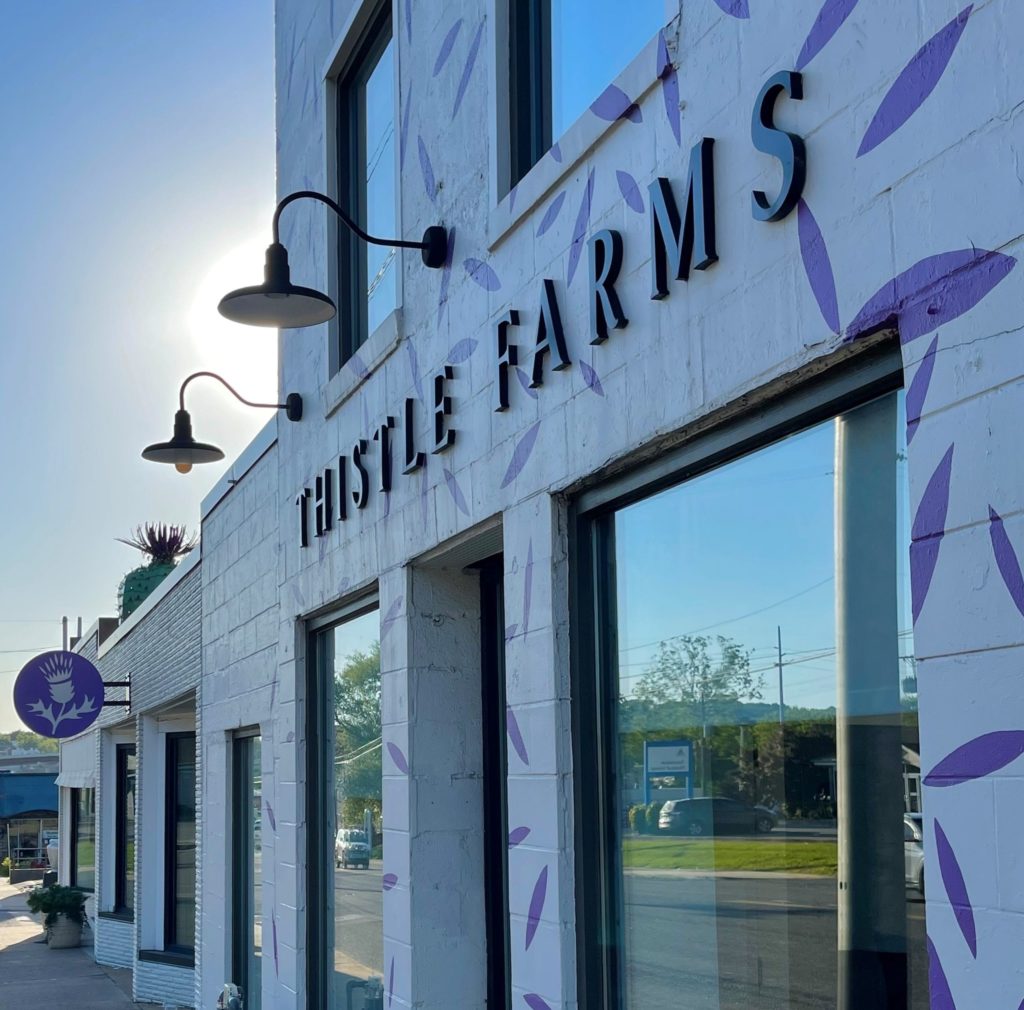For mental health month, Promises Behavioral Health is honored to partner with Thistle Farms, local mental health and recovery leader whose mission is to provide a sanctuary for women recovering from sex trafficking, abuse and addiction. For over 20 years, Thistle Farms has impacted the mental well-being of Nashville and the surrounding areas. The organization has also made thoughtful efforts to expand its mission across the nation. We sat down with Hal Cato, CEO of Thistle Farms, to better understand the organization’s history and what we can expect as our recovery community develops.
Meet Hal
Hal Cato is a native Nashvillian who found his love for Nashville nonprofits right after college. He is actively involved with many organizations in Nashville, including his role in the creation of Hands on Nashville. These experiences were always Hal’s passion projects—something he loved outside of his career. “What gave me the greatest joy in life was what I was doing on the side in nonprofit organizations,” Hal reminisced. So after 10 years of serving as a board member to many local organizations, Hal took his first, full step into the not-for-profit sector as the executive director with Oasis Center.
Hal never expected the opportunity to work with Becca Stevens, founder and president of Thistle Farms. Becca had been a long-time friend and fellow church member with Hal for several years. And while he thoroughly admired the work Thistle Farms was doing for mental well-being, he saw the sphere as a sacred place for women. However, when Becca approached him with the chance to be CEO of the organization, he knew that was what he was called to do.
The History of Thistle Farms
Thistle Farms is a nonprofit enterprise that began its journey in 1997. Founder and president, Becca Stevens, wanted to create a sanctuary for women seeking a safe space to heal from decades of trauma related to sex trafficking, abuse and addiction. She recognized that traditional halfway houses’ old model and rigidity didn’t work for this specific population of women survivors. “She turned it [the model] on its head, and it worked beautifully,” Hal remarked.
Still, after creating such a unique model that relied on empowerment and community for women-focused recovery, there were obstacles. “Women were graduating the program clean and sober, getting their kids back, making restitution with the courts, but they were unemployable because of lack of education or work experience.”
That’s when Thistle Farms began to transform into the organization it is today. The program started small, with just a few hours of dignified work per week. The women learned how to make soap and candles, which could provide them with work experience and a wage.
From there, this model grew, and people loved it. Meeting the women, hearing their stories and sharing this experience all over a small candle or a bar soap would later help build the community into what it is today.
The Importance of Mental Well-Being for Survivors
The mission of Thistle Farms is to help women survivors of trafficking, prostitution and addiction reclaim their lives through safe and supportive housing, build a strong sisterhood and brotherhood of support and offer financial healing through work. Even as the organization has grown and transformed, this goal remains the cornerstone of their community.
With that goal in mind, an essential piece of the puzzle for healing for these survivors is their mental wellbeing. Each woman has access to free mental health treatment to assist them as they work through their trauma.
Hal says it clearly, “The single most important thing we do is help the women who come here to slow down, to rest and get the mental health support that they need to understand what has happened to them fully. And how to deal with it. But more importantly, how to not let it define it them or shape their future and what is possible.”
Yearly campaigns such as Mental Health Month and National Recovery Month help spread awareness and reduce stigma. These efforts also offer resources for lasting connections that each woman survivor needs. “Mental health and wellbeing is an essential gift that we can give because these women have never had that luxury before. Certainly never the ability to build a lasting relationship with a therapist who will stick with them for years.”
Creating A Lasting Impact on Mental Well-Being, Now
As Mental Health Month winds down, we at Promises Behavioral Health honor the importance of our work and the partnerships we create along the way. Joining efforts with Thistle Farms provides vital relationships that help impact our mental health and recovery communities in positive, thoughtful ways.
Both Promises and Thistle Farms believe that every person has unique circumstances, and their care should reflect that. “I think we can work together to get more personalized, individualized support for one another that will help with meeting each woman where they are,” says Hal.
Our recovery communities can still expect creative models that treat individuals and honors their unique story on the local level.
On a national level, we at Promises continue to expand our services, whether that be residential, outpatient or telehealth, by opening our Promises P.A.T.H. locations, along with our newest residential facility, Promises Brazos Valley.
Thistle Farms is doing this by growing nationally through its network of 59 homes that span from coast to coast. The organization is also proudly opening its sister office in Washington, D.C., this summer. Their efforts even extend globally across the world. Thistle Farms works to aid its nonprofit partners in grant funding and program support.
At Promises, we believe that when we heal individuals, communities begin to heal. This message translates in so many ways across so many platforms, and every partnership deepens those efforts.
If you or someone you love needs mental health support, please give us a call at 888.503.1125. We are here to help you heal.
By Chrissy Petrone
Creative Content Manager with Promises Behavioral Health

